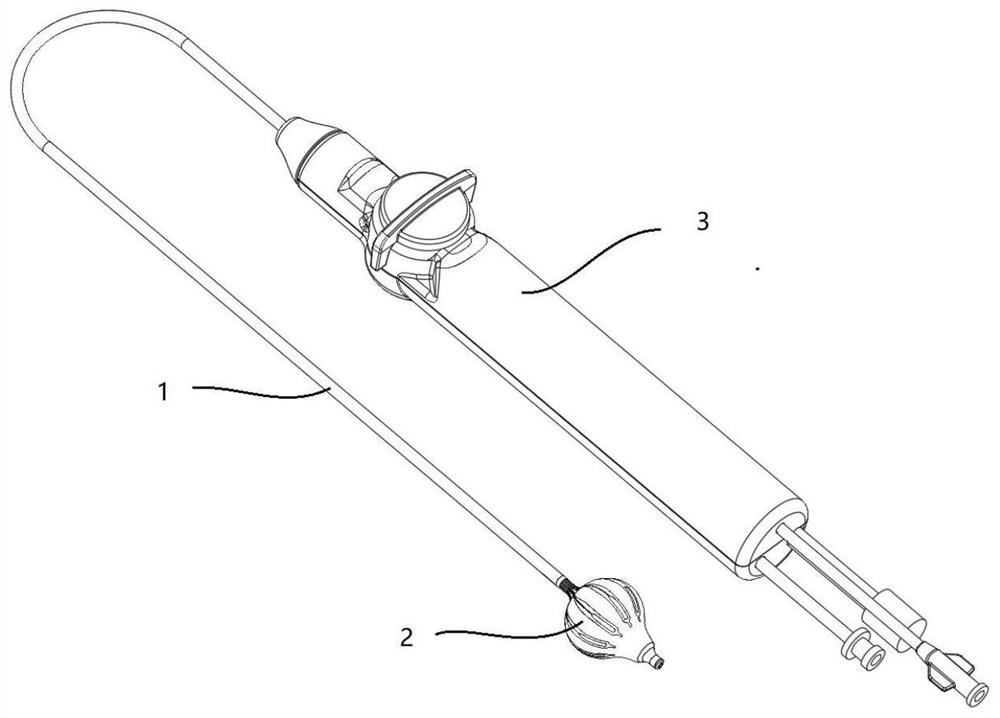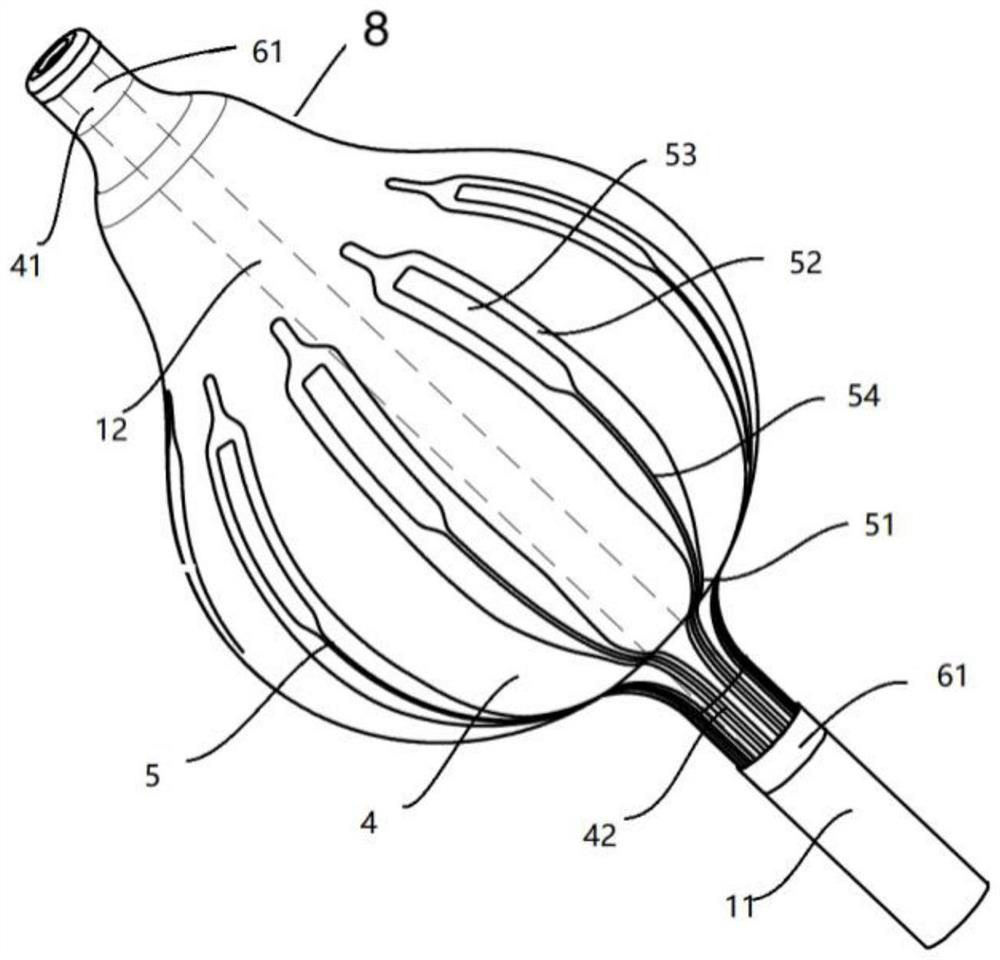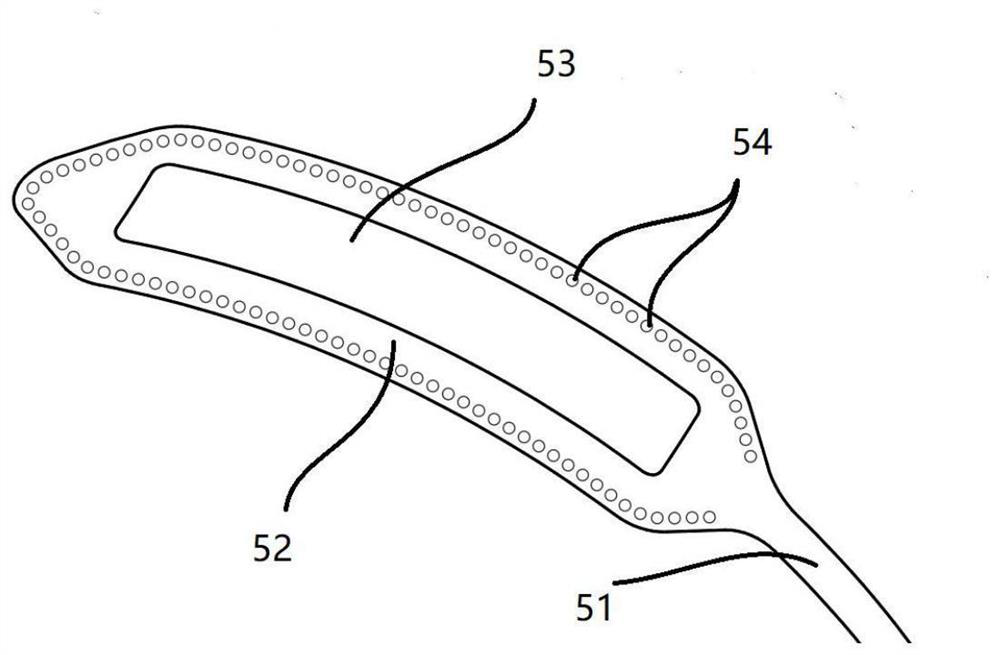Heart electric pulse partition balloon catheter device
A balloon catheter and electric pulse technology, applied in the direction of balloon catheters, heating surgical instruments, etc., can solve the problems of poor rigidity of materials and structures, glue falling off, reducing the ablation effect, etc., and achieve the effect of accurate and convenient positioning
- Summary
- Abstract
- Description
- Claims
- Application Information
AI Technical Summary
Problems solved by technology
Method used
Image
Examples
Embodiment 1
[0048] like Figure 1 to Figure 8 As shown, this embodiment describes a cardiac electrical pulse partitioning balloon catheter device, which belongs to the technical field of pulse ablation surgery and is used to perform electrical pulse ablation surgery on diseased tissue in human blood vessels. Specifically, the present invention designs a cardiac pulse electric field ablation catheter device based on a balloon structure + a flexible circuit for ablation components. The cardiac electrical pulse partitioning balloon catheter device of the present embodiment is composed of the following components:
[0049] It includes a pipeline 1 , an ablation component 2 and a control handle 3 , and the ablation component 2 consists of an inflatable spherical balloon 4 and a plurality of flexible circuits 5 arranged on the outer surface of which are regularly distributed in the circumferential direction.
[0050] The tubing 1 is configured for insertion into an organ of a patient. The abl...
Embodiment 2
[0066] The structure and working mode of this embodiment are basically the same as those of the first embodiment, the difference is that the adjacent electrodes 53 in this embodiment are arranged at different heights from each other. That is to say, the electrodes 53 are regularly arranged in a circumferential wave shape along the central axis 7 at the distal hemisphere of the inflatable spherical balloon 4. The electrodes 53 near the distal end of the inner tube 12 and the electrodes 53 near the equator of the spherical balloon are in The central axis is staggered upwards, which reduces the electrode distribution density at the same latitude, so that the entire ablation component 2 can enter and exit the heart with a smaller outer diameter after collapsing, which increases the passability and reduces the damage of the vascular access. At the same time, it also increases the overall electrode density, enhancing ablation continuity.
[0067] In the expanded state, a larger abla...
Embodiment 3
[0069] The mechanism and working method of this embodiment are basically the same as those of the first embodiment, the difference is that the flexible circuit 5 of this embodiment is divided into a thin part 51 and a wide part 52 , and the wide part 52 is located in the distal hemisphere of the inflatable spherical balloon 4 On the surface, the electrode 53 on the wide part 52 is exposed to the outside, the conductor 54 on the detail part 51 is hidden in the insulating plastic film of the flexible circuit 5, and the detail part 51 is connected from the surface of the ablation part 2 to the external lead in the handle 3 through the outer tube 11, and the electrode The outer surface of 53 is provided with a biocompatible metal coating. The width of the electrode 53 on the wide portion 52 can be set to 0.8-2.0 mm, which is 1 mm in this embodiment, and the length can be set to 2-15 mm; in this embodiment, it is 3.5 mm. The width of the detail 51 may be 0.1-1 mm, and in this embod...
PUM
 Login to View More
Login to View More Abstract
Description
Claims
Application Information
 Login to View More
Login to View More - R&D
- Intellectual Property
- Life Sciences
- Materials
- Tech Scout
- Unparalleled Data Quality
- Higher Quality Content
- 60% Fewer Hallucinations
Browse by: Latest US Patents, China's latest patents, Technical Efficacy Thesaurus, Application Domain, Technology Topic, Popular Technical Reports.
© 2025 PatSnap. All rights reserved.Legal|Privacy policy|Modern Slavery Act Transparency Statement|Sitemap|About US| Contact US: help@patsnap.com



